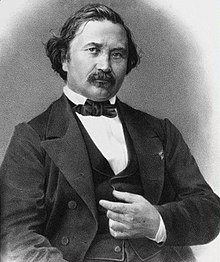
In number theory, Bertrand's postulate is the theorem that for any integer , there exists at least one prime number with
A less restrictive formulation is: for every , there is always at least one prime such that
Another formulation, where is the -th prime, is: for
This statement was first conjectured in 1845 by Joseph Bertrand[2] (1822–1900). Bertrand himself verified his statement for all integers .
His conjecture was completely proved by Chebyshev (1821–1894) in 1852[3] and so the postulate is also called the Bertrand–Chebyshev theorem or Chebyshev's theorem. Chebyshev's theorem can also be stated as a relationship with , the prime-counting function (number of primes less than or equal to ):
- ^ Ribenboim, Paulo (2004). The Little Book of Bigger Primes. New York: Springer-Verlag. p. 181. ISBN 978-0-387-20169-6.
- ^ Bertrand, Joseph (1845), "Mémoire sur le nombre de valeurs que peut prendre une fonction quand on y permute les lettres qu'elle renferme.", Journal de l'École Royale Polytechnique (in French), 18 (Cahier 30): 123–140.
- ^ Tchebychev, P. (1852), "Mémoire sur les nombres premiers." (PDF), Journal de mathématiques pures et appliquées, Série 1 (in French): 366–390. (Proof of the postulate: 371-382). Also see Tchebychev, P. (1854), "Mémoire sur les nombres premiers.", Mémoires de l'Académie Impériale des Sciences de St. Pétersbourg (in French), 7: 15–33












